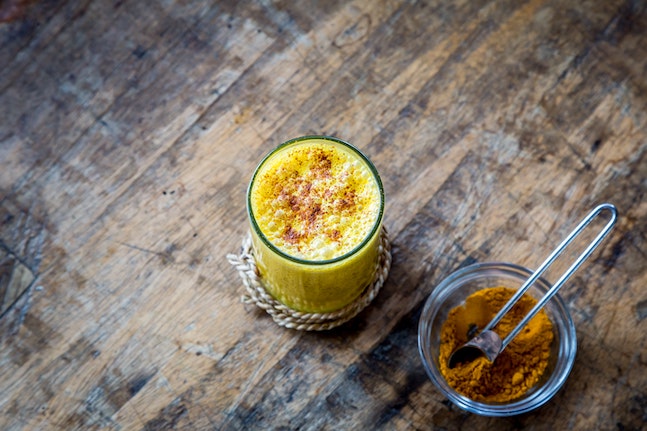Supplement in focus: Curcumin
Curcumin (actually a group of curcuminoids) is the main active ingredient of the root of the turmeric plant, the “solid gold” of Ayurvedic medicine. It is a group of polyphenols with the chemical name of diferuloylmethane. First isolated in 1851, its chemical structure was determined in 1910 during research in Germany. Today turmeric is prescribed worldwide with remarkable effectiveness. Turmeric powder contains about 3 per cent curcumin; curry powder contains less than 0.2 per cent.
Bioavailability
Curcumin in turmeric root has poor bioavailability as it is rapidly metabolised in the liver and the intestinal wall, so has limited use medically. However, when combined with piperine contained in black pepper (or long pepper in Ayurveda), bioavailability increases by 2000 per cent (in humans the dose was 2g curcumin to 20mg piperine). Curcumin is also synergistic with green tea, quercetin and resveratrol.
As curcumin is lipid-soluble, heating it and consuming it with fats increases its bioavailability. Traditionally turmeric was drunk in hot buffalo milk with long pepper.
As curcumin is lipid-soluble, heating it and consuming it with fats increases its bioavailability. Traditionally turmeric was drunk in hot buffalo milk with long pepper. Commercially turmeric is mixed in a phospholipid complex to increase the curcumin’s bioavailability.
Therapeutic effects
Anti-inflammatory and antioxidant
Curcumin has powerful anti-inflammatory activity, directly binding to and modulating the activity of major inflammatory pathways including the COX-2 and lipoxygenase pathways. It downregulates C-reactive protein (CRP) and nuclear factor-kB (NF-kB), the master regulator of inflammation.
It has also been shown to be a more potent antioxidant than vitamin E, and it is the combination of these activities that explains the broad-spectrum effectiveness of this powerful spice.
Neurological
Curcumin has multiple effects on neurological function. It reduces anxiety by enhancing the synthesis of DHA (docosahexaenoic acid) from its precursor α-linolenic acid. DHA is essential for brain development and protection — and is a common deficiency if a person is vegan or does not consume fish, a primary dietary source. A deficiency of DHA is linked to many neurocognitive disorders such as anxiety, Alzheimer’s disease, depression, schizophrenia, psychosis and cognitive impairment.
Cardiovascular
Curcumin has been shown to prevent cardiac hypertrophy and heart failure, reducing both inflammation and fibrosis, and the risk of myocardial infarction in hypertensive rats. It also regulates cholesterol metabolism. In human studies with metabolic syndrome, curcumin was more effective than a placebo in reducing LDLs, total cholesterol, triglycerides and lipoprotein(a), while raising HDL concentrations.
Anti-cancer
Curcumin has multiple effects in cancer therapies — it regulates HER-2 and various inflammatory and invasion and angiogenesis biomarkers. It is a potent inhibitor of a chemical that modulates the expression of antiproliferative and pro-apoptotic genes, thus inhibiting the proliferation and survival of almost all types of tumour cells.
It has been shown to increase the sensitivity of chemotherapeutic agents and radiotherapy in tumour cells, making these therapies more effective in cancer treatment.
Human trials have been conducted on patients with multiple bowel polyps. Participants who were given 400mg three times a day of curcumin for six months showed a decrease in the number and size of the polyps by 50–60 per cent. Compare this with the administration of celecoxib (a medical COX-2 inhibitor approved for this condition) only showing a 28–30 per cent reduction — and with cardiotoxic side effects.
Antimicrobial and antiviral
Research shows curcumin to have significant antibacterial activity against a broad range of bacteria including Staph aureus and H pylori; and antiviral activity against HIV, the influenza viruses, herpes viruses, human papilloma virus and both hepatitis B and C. It has also shown antifungal activity against a range of fungi, including Candida albicans. Curcumin has also been shown to inhibit biofilm activity.
Liver
Curcumin reduces hepatic inflammation through the NF-kB pathway, and prevents alcohol-induced liver damage by reducing the biochemical changes induced by alcohol. It also ameliorates pancreatitis, whether induced by alcohol or other causes.
Digestive System
Human clinical trials have shown curcumin to have anti-inflammatory activity against both Crohn’s disease and ulcerative colitis and was particularly useful in preventing relapses.
Arthritis
In a study on rheumatoid arthritis, curcumin was found to be more effective in reducing pain than Voltaren, with less toxicity and fewer side effects.
Another study on patients with osteoarthritis showed that curcumin (in a phosphatidylcholine complex) was clinically effective in relieving pain by measurably reducing CRP, and in the treatment and ongoing management of this condition.
Cautions and contraindications
In human studies no discernible toxicity or adverse effects have been observed, even with doses of up to 15g curcumin per day for three months. For general use researchers suggest 180mg curcumin daily with safety. Higher doses may be required for specific conditions.








